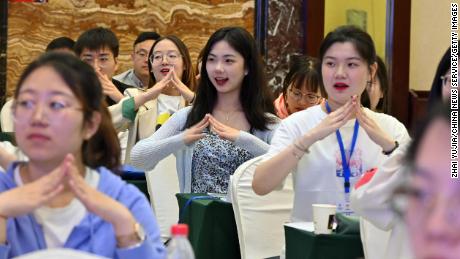Analysis: More than 1 million people apply to enter Beijing’s Covid-free Olympic bubble

Since applications opened nearly two years ago, more than 1 million people have applied to work unpaid at the Beijing Games, which will be held in February, state-run tabloid But the upcoming Winter Games are taking place in a drastically different environment, with China one of the world’s few remaining “zero-Covid” holdouts. Even as other countries in the region and around the world begin to open up and “live with Covid,” Chinese officials show no signs of backing down from stringent measures and border closures in the pursuit of a virus-free country.In recent weeks, a resurgence of the virus has seen cases reported in more than a third of China’s provinces and regions, prompting local governments to introduce punishing travel restrictions and place millions of people under snap lockdowns.In some ways, the situation echoes the pandemic-delayed Tokyo 2020 Summer Olympics, which were held earlier this year against the backdrop of a Covid crisis in the host country. As athletes gathered in the Japanese capital from July to August, daily new cases spiked and Tokyo was placed under a state of emergency.The Japanese government’s determination to hold the Games despite the Covid risk was controversial, and public support plummeted. Though 80,000 people initially signed up to volunteer at the Games, at least 10,000 had quit by mid-June, mostly over Covid concerns. Many were still waiting to get vaccinated, and said they received little protection against Covid beyond cloth masks and hand sanitizer.There appears to be none of that reluctance in China — reflecting a confidence in the country’s Covid prevention measures, which are broadly popular among the public. Unlike the vaccination delay before the Tokyo Olympics, China rolled out its inoculation program with remarkable speed and efficiency. So far more than 2.2 billion doses have been administered in mainland China, according to the country’s National Health Commission on Tuesday.To ensure the Olympics don’t cause an outbreak among the population, Chinese organizers will hold the Games in what’s been billed as a “Covid-safe bubble” around Beijing, intended to separate athletes and participants from local residents. Only people who live in mainland China will be allowed to attend the Games as spectators.But the Beijing Games haven’t avoided controversy. Human rights activists have called for the United States and other democracies to boycott the event, citing Beijing’s alleged human rights abuses in Tibet, Xinjiang and Hong Kong. The Chinese government has repeatedly denied these claims.International journalists have also criticized organizers for lack of transparency and access. On Tuesday, the Foreign Correspondents’ Club of China said on Twitter that foreign journalists had been excluded from events, blocked from news conferences and prevented from reporting on the preparations.But the controversy abroad has not dampened enthusiasm at home. Even a grueling selection and training process hasn’t deterred the army of young volunteers. One selected volunteer, student Li Wanghua, told state-run China Daily she had to complete more than 20 training sessions online before taking a series of exams. The applicants were tested on their knowledge of winter sports and the Games, as well as their English skills, before undergoing interviews.Then came the workout. Since many of the competitions will be held outdoors in the snow, volunteers must complete physical assessments such as cross-country walking 15 kilometers (9.3 miles) to train their stamina and resistance to cold, Li said.That’s just the beginning of their training, which will last through the end of the year for the 20,000 selected volunteers, according to Global Times. The training program includes learning service etiquette, emergency care, Covid prevention strategies, and basic psychological and physical health care.The job may also come at a personal cost. One volunteer who was selected to work at the Beijing airport said she has to clock in two weeks before the Games begin, meaning she will miss Lunar New Year celebrations. It’s one of China’s biggest annual holidays when families typically gather — akin to Thanksgiving or Christmas in the US.But for the volunteers, little of that matters: the Olympics provide them — and China — a triumphant moment in the global spotlight.”The professionalism and passion of the volunteers of the Beijing Olympics in 2008 are deeply imbedded in my memory, although I was only a primary school student back then,” Li told China Daily. “It’s an honor to have the opportunity to emulate them.”






